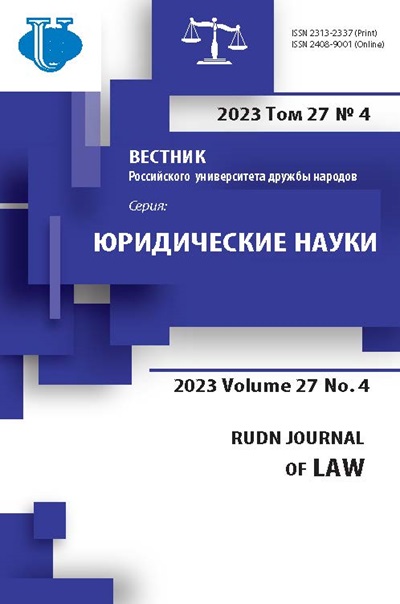Rule of law as a political and legal ideal in the Anglo-Saxon legal tradition
- Authors: Allalyev R.M.1
-
Affiliations:
- RUDN University
- Issue: Vol 27, No 4 (2023)
- Pages: 859-870
- Section: STATE AND LAW IN CONTEMPORARY WORLD
- URL: https://journals.rudn.ru/law/article/view/36891
- DOI: https://doi.org/10.22363/2313-2337-2023-27-4-859-870
- EDN: https://elibrary.ru/FPWVLV
- ID: 36891
Cite item
Full Text
Abstract
The article gives a critical analysis of the rule of law concept in the Anglo-Saxon political and legal tradition. The main criticism concerns its conceptual weakness, isolation from the real economic and political processes dominating in the society. The concept, once widely used both in the legal and political spheres, has become a kind of “buzzword” without clearly defined content. The lack of understanding of the rule of law concept among the public and inability of the scientific community to give any generally accepted explanation of the essence of this concept is ultimately expressed in failure of the population to follow some reasonable norms of behavior. In such a situation, even moral norms surrender to the policy of force and pursuit of selfish interests. The lack of theoretical rigor in the use of the rule of law concept is the reason that ultimately led some critical scientists in the West to question the relevance of the study of various conceptual approaches to it. The rule of law concept, previously presented as the main solution to many modern problems, such as poverty, corruption, terrorism, etc., is currently experiencing a severe crisis. The author concludes that understanding of this socio-cultural phenomenon may be reached not through examining liberal values but through investigating socio-economic development of society.
About the authors
Ruslan M. Allalyev
RUDN University
Author for correspondence.
Email: Allalyev_rm@pfur.ru
ORCID iD: 0000-0002-0334-6862
Candidate of Legal Sciences, Associate Professor of the department of Theory of Law and State, Law Institute
6 Miklukho-Maklaya str., Moscow, 117198, Russian FederationReferences
- Agamben, G. (1998) Homo sacer: sovereign power and bare life. Stanford, CA, Stanford University press.
- Baddeley, M. (2017) Behavioural economics: a very short introduction. Oxford University press.
- Bekisheva, S.R. (2017) Legal state and the rule of law: problems of correlation and practical implementation in the Russian legal system. Law Herald of Dagestan State University. Vol. 23(3), 18-25. https://doi.org/10.21779/2224-0241-2017-23-3-18-25 (in Russian).
- Cain, M. & Hunt, A. (1979) Marx and Engels on Law. London, Academic press.
- Chenoweth, E. & Shay, C.W. (2020) List of campaigns in NAVCO 1.3. Harvard Dataverse, V1. https://doi.org/10.7910/DVN/ON9XND.
- Cornforth, M. (1946) Science versus idealism. London, England, Lawrence & Wishart.
- Crouch, C. (2004) Post-Democracy. Cambridge, Polity press.
- Dahl, R.A. (1956) Preface to democratic theory. Chicago. University of Chicago press.
- Foner, E. (2015) Gateway to freedom: the hidden history of the underground railroad. Oxford, England, Oxford University press.
- Fry, T.H. (2020) A new design philosophy: an introduction to defuturing. Bloomsbury visual arts.
- Graeber, D. (2012) Debt: The First 5000 years. Brooklyn, Melville House.
- Grinberg, L.G. & Novikov, A.I. (1977) Criticism of modern bourgeois concepts of justice. Leningrad, Nauka Publ. (in Russian).
- Held, D. (1987) Models of democracy. Stanford, Stanford University press.
- Holmes, S. (2003) Lineages of the rule of law. In: Maravall, J. & Przeworski, A. (eds.). Democracy and the Rule of Law. Cambridge studies in the theory of democracy, pp. 19-61. Cambridge, Cambridge University press. https://doi.org/10.1017/CBO9780511610066.002/
- Hübner, K. (1985) Die Wahrheit des Mythos. München, Verlag С. H. Beck.
- Huntington, S.P. (2004) The clash of civilizations and the remaking of the world order. New York, Touchstone.
- Jefferson, T. (1790) On relocation of seat of Government. Available at: https://www.loc.gov/ resource/mgw2.028/?sp=317
- Jessop, B. (2015) The State: past, present, future. Polity.
- Kelle, V.Zh., Mirskaya, E.Z. & Ignatiev, A.A. et al. (1988) Modern Western Sociology of Science: Critical Analysis. Moscow, Nauka Publ. (in Russian)
- Lindblom, C. (1978) Politics and markets: the world's political economic systems. New York, Basic Books, Inc. Publ.
- Locke, J. (1924) Two Treatise of Civil Government. London, J.M. Dent & Sons Ltd.
- Maltsev, G.V. (2013). Cultural traditions of law. Moscow, Norma Publ. (in Russian).
- Marochkin, S.Yu. (2014) The interaction of legal systems as a general development trend (the international community's attitude to the rule of law: expectations and reality). The Russian Juridical Journal. 5(98),15-25. (in Russian).
- Morgan, K. (2010) The Oxford History of Britain. Oxford, Oxford University Press.
- Rifkin, J. (2011) The third industrial revolution : how lateral power is transformimg energy, the economy, and the world. New York, Palgrave Macmillan.
- Smith, A. (1982) The wealth of nations: books 1-3. London, Penguin group.
- Sogrin, V.V. (1983) Founders of the U.S.A.: Historical Portraits. Moscow, Nauka Publ. (in Russian)
- Stepan, А. & Linz, J.J. (2011) Comparative perspectives on inequality and the quality of democracy in the United States. Perspectives on Politics. (9), 841-856.
- Stiglitz, E. (2013) the price of inequality: how today's divided society endangers our future. New York, W.W. Norton & Company.
- Stiglitz, J. (2016). The great divide: unequal societies and what we can do about them. New York, W.W. Norton & Company.
- Stiglitz, J. (2019) People, power, and profits: progressive capitalism for an age of discontent. York, W.W. Norton & Company.
- Tawney, R.H. (1926) Religion and the rise of capitalism. New York, Harcourt, Brace and Company.
- Wallerstein, I. (2004) World-systems analysis: an introduction. Durham and London, Duke University press.
- Wood, G. (2012) The idea of America: Reflections on the Birth of the United States. London, Penguin books.
Supplementary files















